No Results Found
The page you requested could not be found. Try refining your search, or use the navigation above to locate the post.
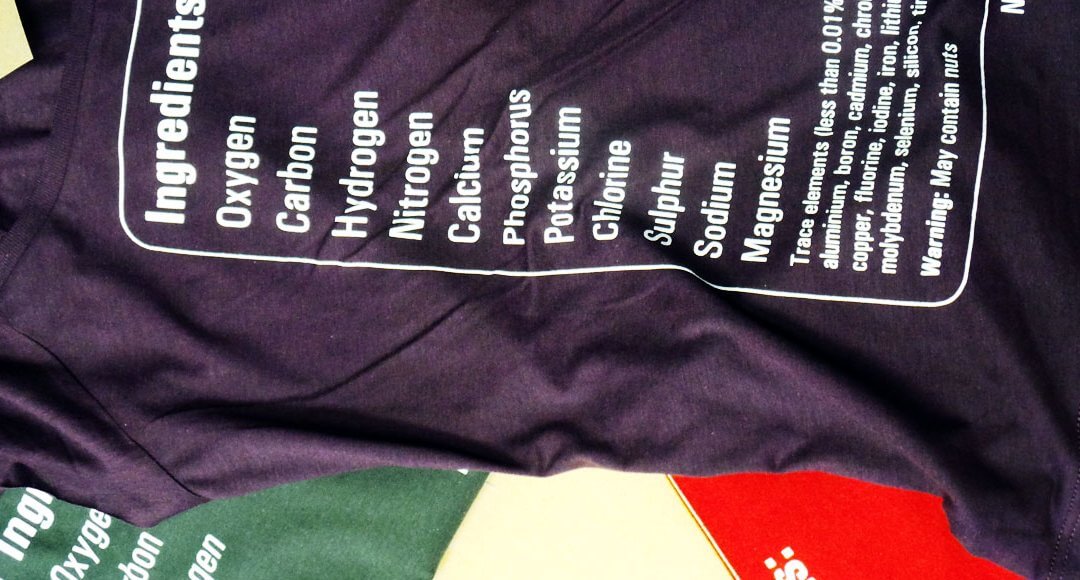
What are we made of?
What are the elements that make up the human body?
The first question sounds a little metaphorical and will probably be addressed sometime in the future. But for now, the latest uchi track addresses the physical, or, more accurately, the chemical. I’m a science geek and a T shirt showing the chemical elements that make up the human body has been on the back burner of my mind for some time. It felt right to follow the last uchi T-shirt “Stereotype” with another typography design – contrasting, but also related. Think of it as the B Side to Stereotype.
A T-shirt displaying the chemical elements of the human body.
A bunch of stats from various academic websites to get the elements as well as each element’s mass (all with slightly varying approximations). I’ve since learnt that the exact amounts vary from person to person.
So how do you display the elements of the human body in a simplistic design? A graphical, infographic design? Maybe a pie chart or graph? Following on from ‘Stereotype‘, I thought “simple is best” and decided to rely solely on text and my typographical training to communicate the idea.
I wanted the names of each element to be printed in proportion to each other’s relative size. But this proved problematic, in terms of both design and print.
The human body is composed of 11 main elements, with six of these (oxygen, hydrogen, carbon, nitrogen, calcium and phosphorus) making up almost 99% of us. In fact we’re all mostly oxygen (65%), carbon (18%) and hydrogen (10%). The other eight elements that are vital to life, include calcium, potassium and molybdenum. But they amount to such small amounts, that by the time you reach magnesium (0.1%) the text would be unreadable on a T-shirt.
So I ditched the ratio idea in favour of a more aesthetically pleasing design. Starting with oxygen and ending with tin, each element’s representation would be slightly smaller than the one before it. I liked it. However, though simple, it wasn’t technically accurate. That was because the order of the trace elements was determined by the size of the word representing them – not by their mass. This bugged me.
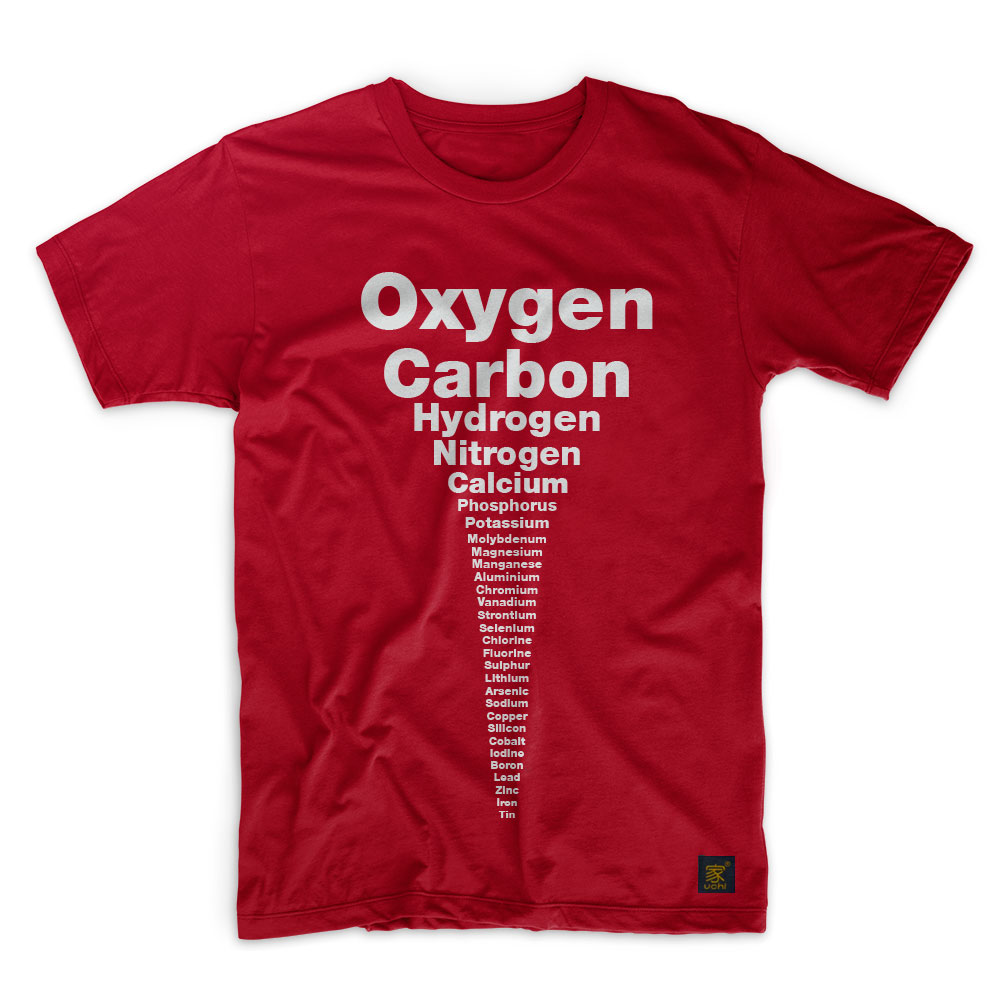
Despite this, I was satisfied enough to show it to a couple of friends. Based on their well-rounded criticism (and approval), I thought about the challenge some more; that was when the ‘food label’ idea hit me.
Imagine a food ingredients label listing the constituents – the ‘ingredients’ of us. Clever and intelligent, I thought. I’ve typeset hundreds of food and drug labels in my time. So again, this should be easy enough.
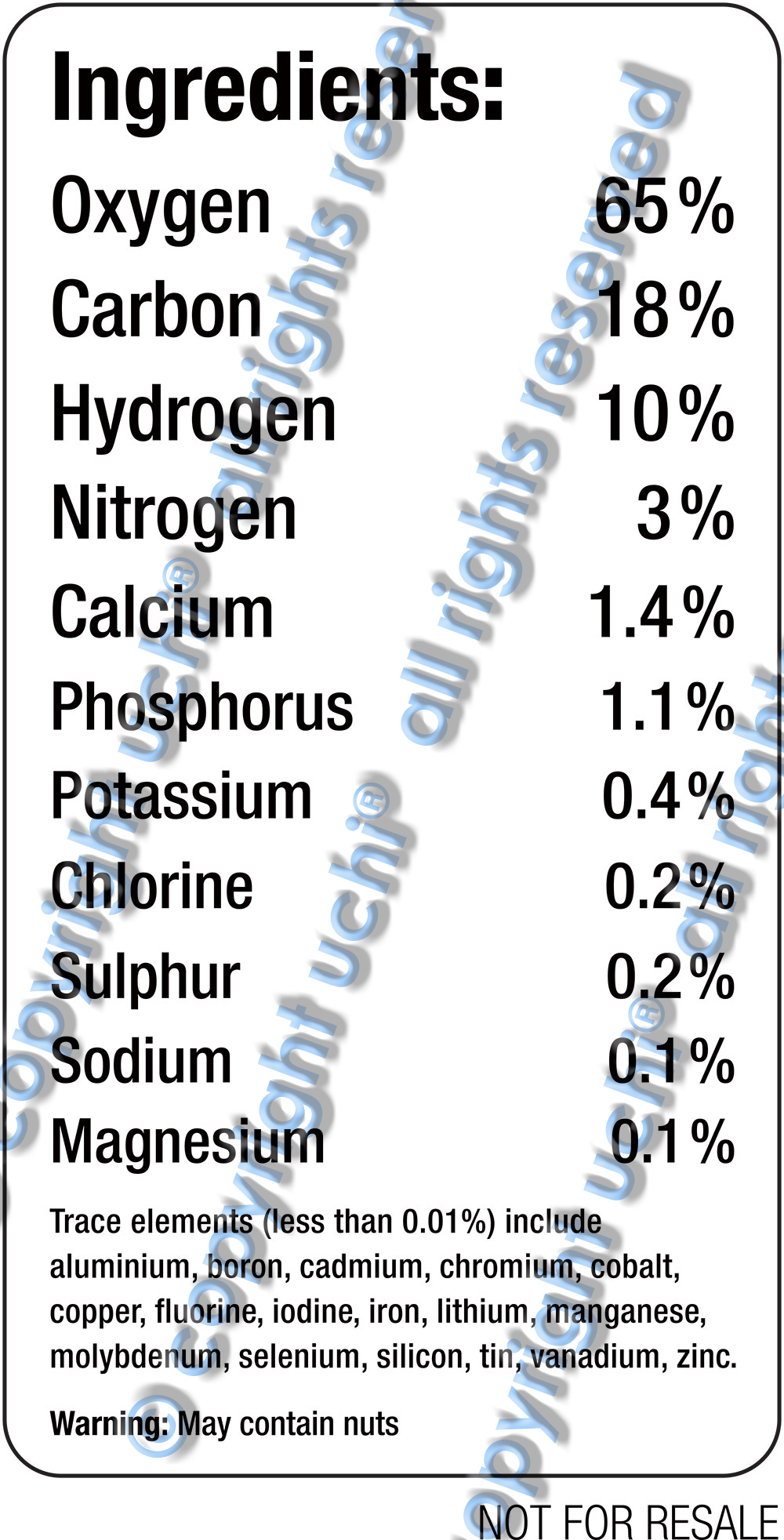
Once the ingredients label design was finished, I still wasn’t entirely happy. Composition wise, everything was fine. All the relevant information was there and nothing more. Plus, the ingredients label premise allowed me to add a couple of extra touches that worked.
I’d used Helvetica Condensed for the ‘Stereotype’ T shirt, so it seemed right to use the same typeface on the B-side. However, at the last minute I decided to revisit my phototypesetting roots and changed the typeface from Helvetica to Univers. In doing so, I realised what had been bugging me.
The Univers typeface family was developed by Adrian Frutiger for the French type foundry Deberny & Peignot. Like Helvetica, it’s based on the 1898 Akzidenz-Grotesk typeface family. However, it lacks Helvetica’s superfluous features and has a more uniform stroke and balance that makes it a perfect typeface for tabular data and forms. Univers also has cleaner lines and better legibility at great distances. On it’s release in 1957, the marketing for Univers deliberately referenced the periodic table to emphasise its scope.
Though its popularity peaked in the 60s and 70s, Univers is stll widely used. Past and present corporate IDs using it include those of General Electric, Deutsche Bank and eBay, while Audi uses a modified version of Univers called Audi Sans. Apple keyboard key-caps before 2003, Ordnance Survey maps, a host of transport systems (including Frankfurt International Airport) and Walt Disney World, are among many other high-profile users.
So, pun intended, Univers was the perfect universal typeface choice for a universal design.
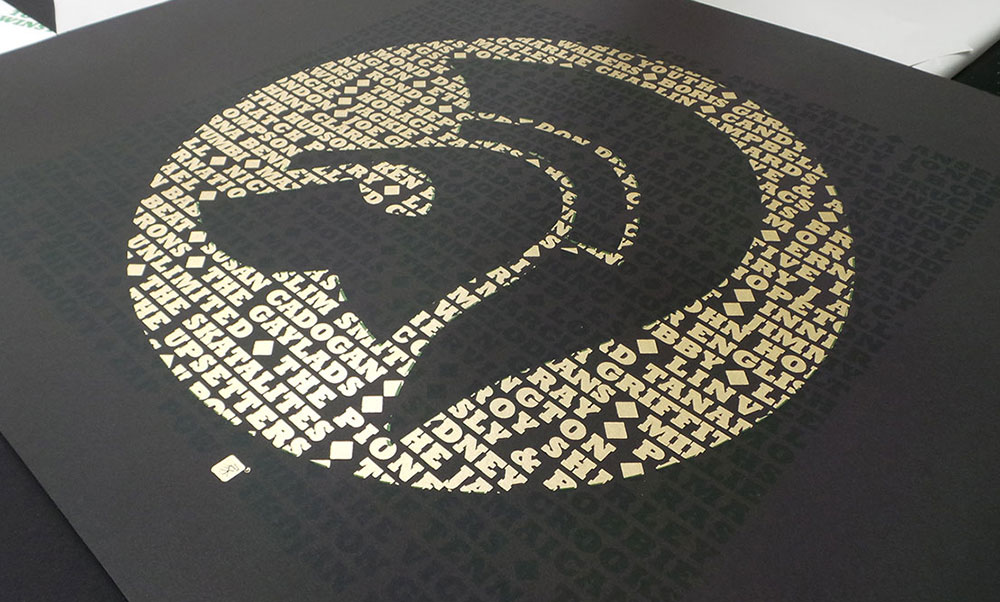
It’s no secret that I love typography and screen printing. So, after the success of the Vinyl Records based T shirts and the Gil Scott Heron limited edition art print, I decided to produce a series of limited edition prints of the Trojan design…
From reggae, ska, rock steady and dub, Trojan Records logos’ endurance is a testament to the music and culture. We haven’t included the complete list of all the artists that appeared under Trojan Records, but hope we’ve caught a few of everybody’s favourites.
Growing up in a house full of reggae records has made the Trojan logo as recognisable to me as the Nike swoosh. It’s no coincidence that the typeface Trojan Records uses is a robust and solid one. Like them, Rockwell Bold evokes strength and stability. They chose well.
A limited edition set of artists proofs, screen printed in metallic gold and dark green and available on black and white fine art papers. Each screen print is unique with different variations of the gold ink mix. As with the previous Star Wars screen print, some have been printed with pure metallic gold and some have been mixed with a orange ink. This is especially apparent on the white Somerset Satin papers. These prints have lot more orange than metallic gold.
Signed and numbered.
The page you requested could not be found. Try refining your search, or use the navigation above to locate the post.

So, after a long wait for sunflower yellow T shirts, the Trojan T shirt reprints are done. I had created an ‘artist’s impression’ of the new yellow T shirts, thinking red and green print on yellow would not only look great, it’d be perfect for a reggae based T shirt. However, the mock-up posted on the product page suggested otherwise. I dismissed this and put it down to it being a mock-up and not a picture of an actual real printed T shirt! I was confident that when actually printed, the colours “will look dope on that colour T shirt!”.
They didn’t. It did remind me of having an eye test. On the yellow T shirts, the depth of the red and green colours was two close. The whole print was too dark to show the Trojan emblem prominently enough through the text – the opposite of what I wanted. The mock-up turned out to be accurate after all.
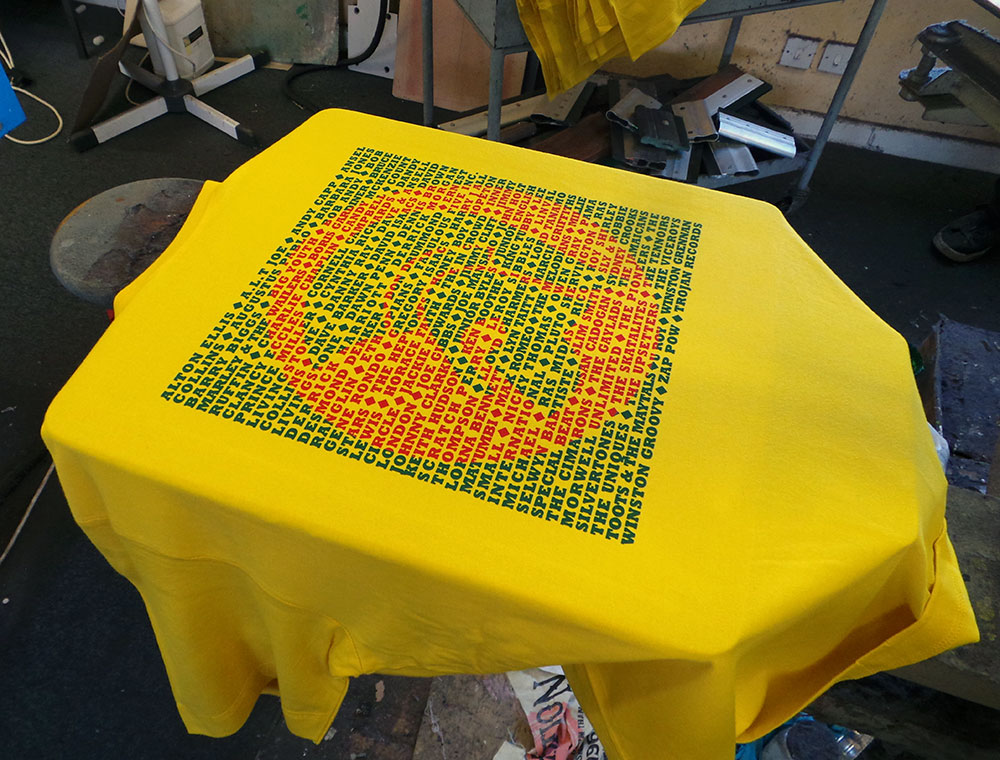
Trojan men’s T shirt – Red Gold and Green?
I was a little disappointed, but (and you have to stay on your feet in this game), I remembered that the last yellow uchi T shirt was printed using a dark golden yellow and the same green we were using, so…
We overprinted the poorly chosen red with the dark yellow and this is what we got.
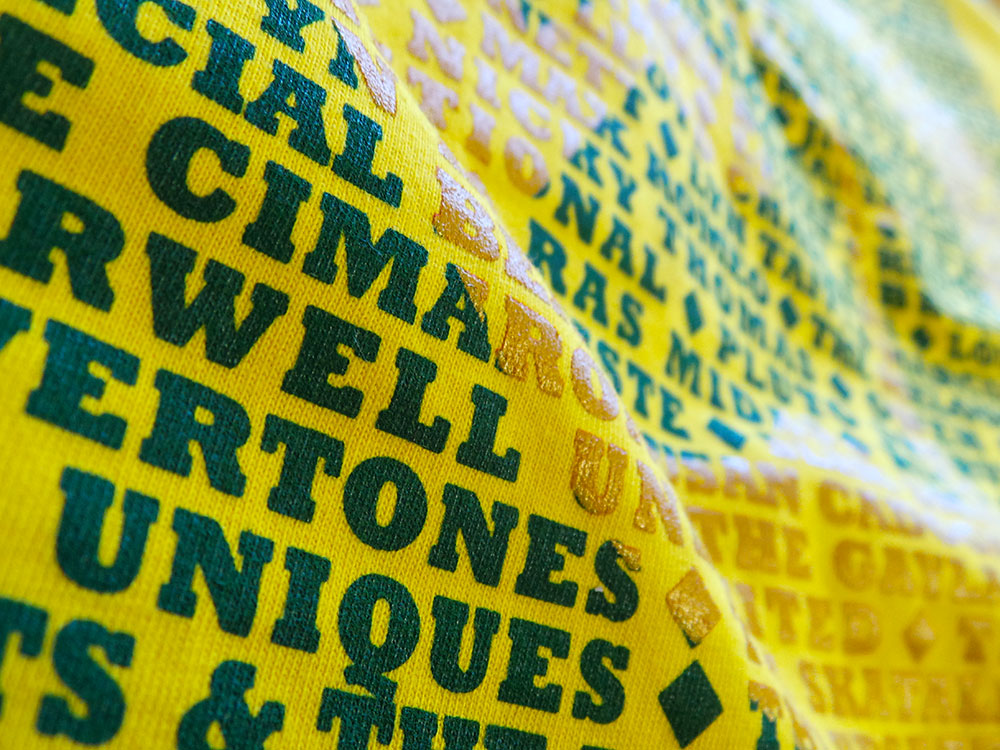
Trojan men’s T shirt – Sunflower Yellow
They say hindsight is a beautiful thing. And with further hindsight, or, by paying attention to the rules of colour instead of getting sentimental about red, gold and green combos, maybe even these current colour ways could be better? If instead, green and gold were printed on the cream and the yellow T shirt had the green/orange combo. Perhaps? It is a very limited run, so the next cream and yellow Trojan T shirts will probably see a reversal of colours… maybe clear and red inks?
Feel free to let me know what colour combo you’d like to see on a future uchi Trojan T shirt.
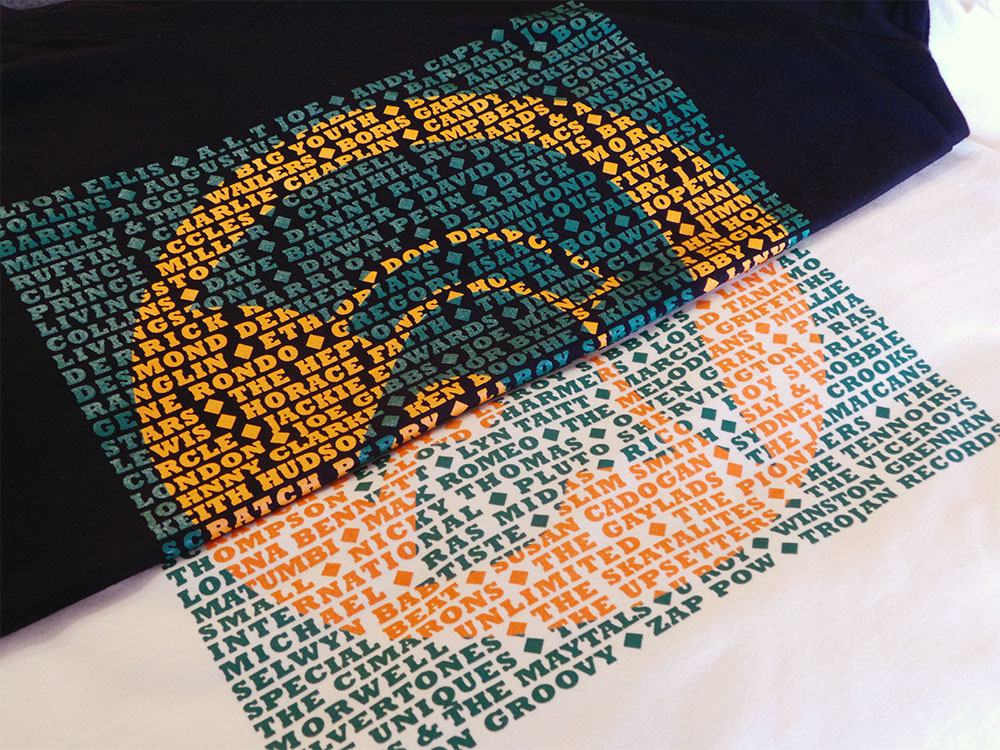
Trojan men’s T shirt – Black and Cream
The page you requested could not be found. Try refining your search, or use the navigation above to locate the post.
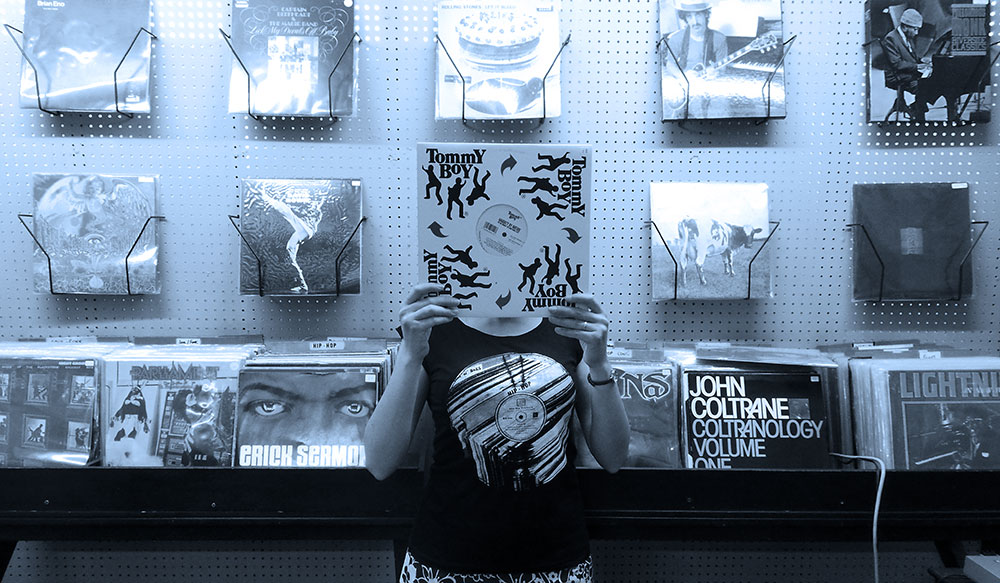
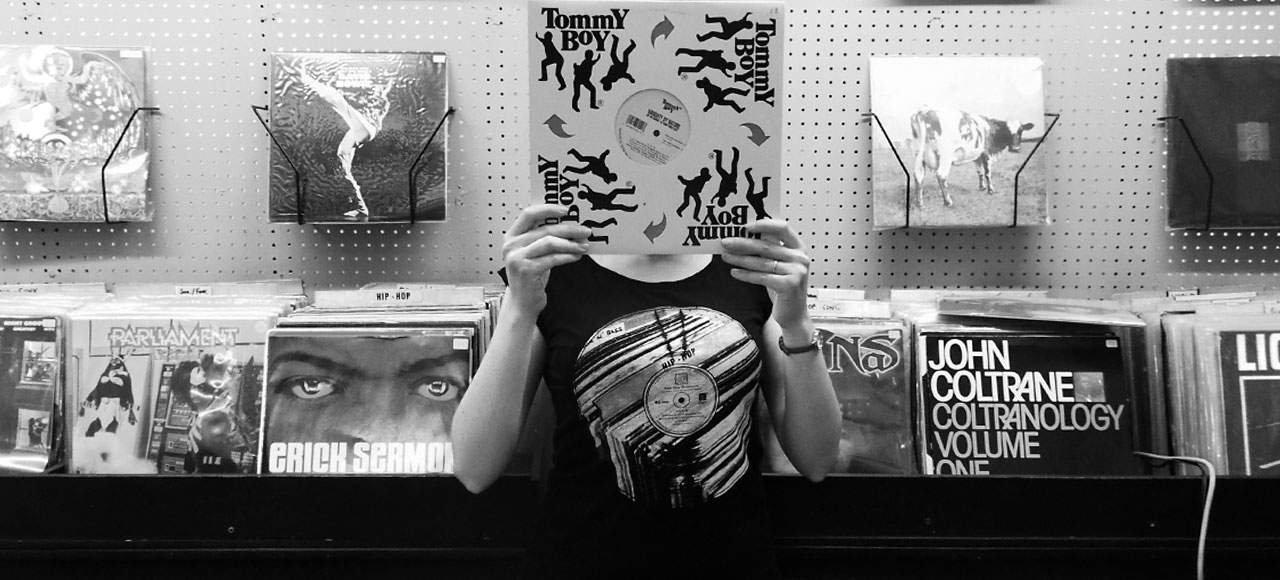
It’s the end of the sixth uchi album of T shirts. All but two of the designs on this as yet untitled album are music related. I am pleased that these last two designs follow the music theme, with a particular focus on vinyl.
There are a couple of new designs that were going to be included, but were not finished in time. On reflection it worked out fine. The two unfinished pieces are very illustrative and more like designs in the pipeline than the ones recently done. So, maybe the next album will be all illustration? We’ll see.
Here are the latest two uchi vinyl-related T shirts and the stories behind them…
Trojan and The Big Payback were influenced by our neighbours here in Bristol – Payback Records.
Founded in 1968, the British founded Trojan Records has one of the most iconic and recognisable logos and a host of equally iconic and renowned artists under its belt.
From reggae, ska, rock steady and dub, its endurance is a testament to the music and culture. We haven’t included the complete list of all the artists that appeared under Trojan Records, but hope we’ve caught a few of everybody’s favourites.
For me, growing up in a house full of reggae records has made the Trojan logo as recognisable as the Nike swoosh, but with a ton of more meaning. It’s no coincidence that they also use a heavy robust and solid typeface like Rockwell Extra Bold.
Although a reggae specialist Payback Records have a great selection of non-reggae vinyl. Their HipHop section is featured on The Big Payback T shirt. Coincidentally, the record store is named after the 1989 EPMD track of the same name; perfect uchi. I was unaware of this connection before I added the type. The Big Payback is one of my favourite EPMD tracks and is somewhere in the stack of old school vinyl in the image. In the shot, I’m actually standing in Payback Records.
Only thing left to do is name the album!
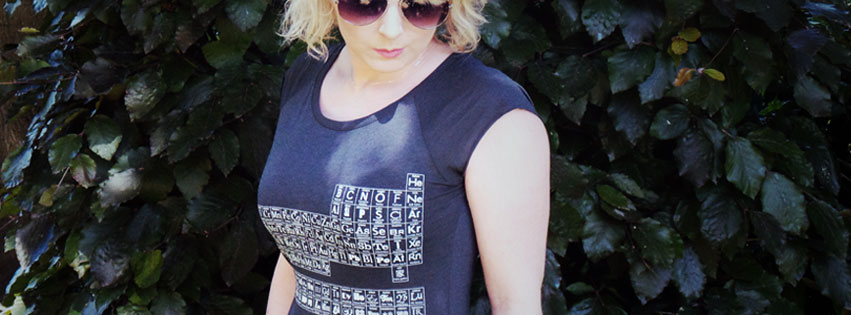
By popular request, here’s the first colour drop of uchi’s Typographic Periodic Table – charcoal grey on a women’s bamboo T shirt.
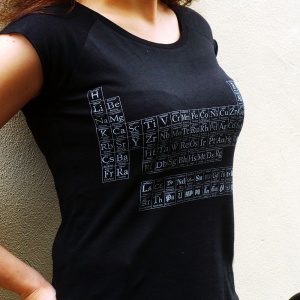 There are many styles of type and many classification systems – defined by their visual characteristics (stroke contrast, serif shape, etc) and their historical development or reference. Here, I’ve tried to match typefaces over the ages into their main classifications within the element groups on the Periodic Table. Also, except for the Lanthanoids and Actinoids (Glyphic, Script, Blackletter and Graphic faces) and, where possible, in each element group, the typefaces are in roughly in date order from the top to bottom. There are some notable exceptions for aesthetic reasons. For example, Helevtica was made in 1957, but it had to be Hydrogen!
There are many styles of type and many classification systems – defined by their visual characteristics (stroke contrast, serif shape, etc) and their historical development or reference. Here, I’ve tried to match typefaces over the ages into their main classifications within the element groups on the Periodic Table. Also, except for the Lanthanoids and Actinoids (Glyphic, Script, Blackletter and Graphic faces) and, where possible, in each element group, the typefaces are in roughly in date order from the top to bottom. There are some notable exceptions for aesthetic reasons. For example, Helevtica was made in 1957, but it had to be Hydrogen!
Want to know your serif from your slab-serif? Read on for a brief description of each type style.